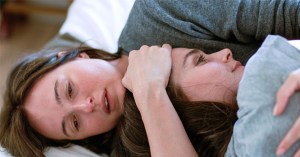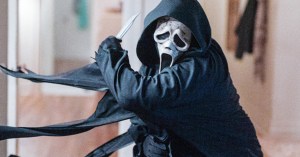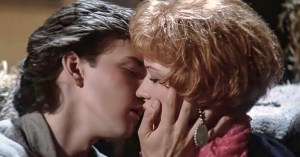Rachel McAdams’ Best Movies
In this week's Total Recall, we count down the best-reviewed work of the About Time star.
It’s hard to build any kind of consensus in this crazy modern world, but if there’s one thing pretty much all of us can agree on, it’s that Rachel McAdams is adorable. Her winsome charm, already put to excellent use in a series of hits that includes The Notebook and Midnight in Paris, returns to the big screen this weekend in the date movie of the season: Richard Curtis’ About Time, a romantic comedy with more on its mind than your average meet-cute. In honor of McAdams’ latest outing, we decided to take a look back at some of the brighter critical highlights from her filmography — which contains a lot more variety than you might expect. It’s time for Total Recall!
10. The Notebook
Maligned by critics and boyfriends, 2004’s The Notebook positioned Rachel McAdams and Ryan Gosling for romantic weepie superstardom, placing them opposite one another in a Nick Cassavetes-directed adaptation of the Nicholas Sparks bestseller about star-crossed lovers whose beautifully filmed affair is torn asunder by her controlling parents (and World War II). It’s the kind of stuff that has served as grist for countless Lifetime movies, and not a few scribes rolled their eyes at the swelling music and sweeping cinematography — but for others, The Notebook represented a sensitively assembled, solidly acted paean to a style of filmmaking long out of vogue. Opined an appreciative Rex Reed for the New York Observer, “How rare to see a film that says there is still a value system out there, that being thoughtful and caring is not uncool.”
9. Married Life
McAdams took a stab at a Hitchcock-style psychological thriller with 2008’s Married Life, which found director Ira Sachs co-adapting (with Oren Moverman) John Bingham’s 1953 novel Five Roundabouts to Heaven. Starring Chris Cooper as a middle-aged businessman who embarks on an affair with a pretty young war widow (McAdams), this WWII-set picture takes a dark turn when Cooper’s character decides he wants to end his marriage, but can’t bear to hurt his wife — so he decides to poison her instead, and makes the crucial mistake of telling his friend (Pierce Brosnan), whose own libido ends up putting everyone at risk. “The roundelay structure and Hitchcockian nods could have easily given way to a sardonic puppet theater,” admitted CinePassion’s Fernando F. Croce, “but Sachs and Moverman care too much about their characters to turn them into pawns.”
8. Morning Glory
Remember the cheerfully old-fashioned, beautifully shot workplace comedies of the 1980s? So does Aline Brosh McKenna. The Devil Wears Prada screenwriter scripted this comfortingly old-school entry in the genre, helmed by Notting Hill director Roger Michell and featuring a cast of pleasantly familiar faces. Starring McAdams as the button-cute executive producer of a flailing national morning show, Harrison Ford as the curmudgeonly new co-host, and Diane Keaton as the show’s put-upon longtime anchor, Morning Glory tapped into a neglected filmmaking vein once regularly drawn upon by everyone from James L. Brooks to Mike Nichols. Unfortunately, in spite of its impressive pedigree, Glory failed to find favor with many critics, and its middling grosses seemed to suggest that modern moviegoers were no longer all that interested in the travails of a heel-kicking upper middle-class gal and her lovably dysfunctional co-workers. Still, it found its defenders, among them Dave White of Movies.com, who wrote, “Ford is a snarling cartoon version of his grim political thriller self played for laughs. And McAdams is no Mary Tyler Moore, but she’s just this side of being that appealing.”
7. Sherlock Holmes: A Game of Shadows
While it didn’t offer as much screen time as some of her other projects, McAdams’ return to the role of Irene Adler for the Sherlock Holmes sequel, A Game of Shadows, added another top-grossing feature to her résumé — and her rumored million-dollar payday further cemented her status as one of the more in-demand young actors in Hollywood. And although Shadows suffered from the same diminishing critical returns as many sequels, its blend of dark mystery and thrilling action proved sufficiently potent for critics like Joe Neumaier of the New York Daily News, who argued, “Ritchie’s franchise — 7% classic formula, 93% adrenaline — is smart in a showoffy way that flatters its star as well as its audience.”
6. Sherlock Holmes
Over 100 years after he made his debut on the printed page, Sir Arthur Conan Doyle’s famous detective got the CGI-assisted blockbuster treatment in the aptly titled Sherlock Holmes, starring Robert Downey, Jr. as the intrepid sleuth and Jude Law as his faithful sidekick Watson. Joined by Rachel McAdams as the mysterious Irene Adler and assisted by Guy Ritchie’s action-heavy direction, Holmes made solving 19th-century mysteries cool again — and entertained critics such as Bill Goodykoontz of the Arizona Republic, who wrote, “Playing literature’s greatest detective as a sort of self-loathing action hero, Downey has an absolute blast. And thanks to his performance in Sherlock Holmes, so do we.”
5. Wedding Crashers
R-rated comedies enjoyed a box office renaissance after the turn of the century — including Wedding Crashers, which put stars Vince Vaughn and Owen Wilson square in their respective wheelhouses with a storyline about a pair of lecherous buddies whose fondness for shacking up with bridesmaids hits a snag when they meet a pair of sisters (Isla Fisher and McAdams) whose formidable charms prompt some painful re-evaluation. Though some critics had problems with Crashers‘ uneven tone — and the scads of gratuitous flesh on display in the movie’s opening montage — most found it too much fun to resist. “The likes of the sneakily subversive Wilson and Vaughn deserve better,” wrote MaryAnn Johnson of Flick Filosopher, “but this is darn close to a perfect showcase for what they can do, and how much better they do it together.”
4. Red Eye
Red Eye put director Wes Craven back behind the cameras following a five-year break — and delivered a taut, claustrophobic thriller about a hotel manager (Rachel McAdams) who finds herself sitting next to a terrorist (Cillian Murphy) on an overnight flight. The tight-focused setup of Carl Ellsworth’s script eventually gives way to an overblown final act involving an assassination attempt (and an underwater missile), but most critics didn’t mind; as Roger Ebert wrote, “After a summer of crashes, bangs, endless chase scenes and special effects that belittle the actors standing in front of them, what a pleasure to see characters in a thriller doing what people like themselves possibly could do.”
3. Mean Girls
Romantic dramas and teen comedies don’t get a lot of critical love, but McAdams struck gold with entries from both genres in 2004, smooching a sun-dappled Ryan Gosling in The Notebook and piling on the lip gloss to play the strikingly pretty leader of a perfectly vapid high school clique in Mean Girls. Lindsay Lohan got the lion’s share of the attention for her solid work as Cady Heron, the bookish recent transplant who struggles to fit in with the popular crowd at her new school, and Tina Fey earned plenty of praise for her funny, smartly written script. But Mean Girls wouldn’t be Mean Girls without its mean girls, and that McAdams-led trio (rounded out by Amanda Seyfried and Lacey Chabert) was a big part of what made the movie for critics like the Globe and Mail’s Liam Lacey, who called McAdams “deliciously evil” in the role.
2. State of Play
Times are tough for reporters in the real world, but in Hollywood, they’re still good for the occasional hard-bitten thriller. Case in point: Kevin Macdonald’s State of Play, which adapts the BBC miniseries about a reporter (Russell Crowe) and his young mentee (McAdams) investigating the death of a Capitol Hill staffer (Maria Thayer) who had been involved in an extramarital affair with a Congressman (Ben Affleck). Loaded with enough old-school intrigue to provoke a slew of All the President’s Men comparisons, State of Play is the kind of thinking man’s thriller that’s all too rare these days (and with an $87 million gross against its $60 million budget, it’s painfully easy to see why studios have lost interest). Even if audiences weren’t in the mood for a political murder mystery, most critics were taken with Play, including Christopher Tookey of the Daily Mail, who wrote, “Even if you don’t normally bother with movies, cheer yourself up by seeing this. There hasn’t been a more engrossing or intelligent political thriller in the past three decades.”
1. Midnight in Paris
Woody Allen endured some relatively bumpy years during the 1990s and early aughts, but things turned around for 2011’s Midnight in Paris, a late-period smash that brought Allen some of the warmest reviews (and the highest grosses) of his career while telling the the fantasy-infused comedic tale of an ennui-addled screenwriter (Owen Wilson) whose rocky relationship with his dismissive fiancee (McAdams) sends him out for a melancholic walk on the streets of Paris, where he ends up taking much more of a journey than he bargained for. “Woody Allen seemed to have lost his fizz as a filmmaker of late,” observed Jason Best for Movie Talk, “and then he uncorked the sparkling Midnight in Paris, a comic fantasy with all the effervescence of vintage champagne.”
In case you were wondering, here are McAdams’ top 10 movies according RT users’ scores:
1. The Notebook — 84%
2. Midnight in Paris — 82%
3. Sherlock Holmes — 78%
4. Sherlock Holmes: A Game of Shadows — 77%
5. State of Play — 71%
6. Wedding Crashers — 69%
7. Mean Girls — 66%
8. Red Eye — 65%
9. The Vow — 63%
10. The Hot Chick — 62%
Take a look through McAdams’ complete filmography, as well as the rest of our Total Recall archives. And don’t forget to check out the reviews for About Time.




